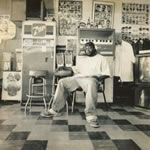|
|
 |
Dusted Reviews
Artist: Guilty Simpson Album: Ode to the Ghetto Label: Stones Throw Review date: Mar. 21, 2008 |

|
|
|
 |
Stones Throw, despite its current and solid foundation in underground hip hop, is not a label with a reputation for orthodoxy. But sometimes, as Guilty Simpson’s debut full-length Ode to the Ghetto proves, it’s good to return to form.
A Detroit rapper whom Motown monarch Jay Dilla touted, Guilty Simpson is a full-throated lyricist whose voice calls to mind a less weepy Beanie Segal. He performs in a style that could be described as Midwestern; his cadence is measured, seemingly never hurried or in need of an unnecessary pause, almost like a metronome. As Ode’s exacting and funereal “Kill Em” suggests, Simpson’s most direct progenitor is Kool G Rap, whose prototypical and precise gangsta rap can be traced across numerous contemporary acts. While most mainstays – Biggie Smalls, Jay-Z, Nas, and so on – evolved from those Juice Crew conventions, Simpson, by contrast, returns directly to the source. There is little contemporary flair to be found in Simpson’s words. He keeps it simple and unencumbered by modern pretense.
Though his simplicity may hark to an earlier era, Simpson should not be defined as a stick-in-the-mud traditionalist or, worse, a bore. Simpson may be plainspoken, but he’s hardly plain. True, his delivery is straight and by the books, but with his conservative approach, Simpson conveys a disposition rarely found in hip hop – the deadpan. Simpson prominently displays this playfulness on Ode’s “Robbery.” The track slyly takes armed theft and, in Oh No’s bouncy production, renders it a child’s singsong, spelling out, letter-by-letter, the title in the chorus and, step-by-step, the events of a stick-up in the verses. “Robbery” is perhaps the most amusing heist narrative since “Gimme the Loot.” And, like Biggie’s original, Simpson’s straight face makes it unclear whether we should laugh or cower.
At several points on Ode, Simpson overextends his humor into silliness. “I Must Love You,” the single track produced by Dilla here, is reminiscent of another Detroit native, Eminem. The song’s chorus, which Simpson sings in a high register, ends in a series of la-la-las and fully crosses the line between adulthood and childhood, one “Robbery” or Ode’s “Footwork” only touched. Eminem used this device to great effect as a means of representing his recalcitrant id. But, in Simpson’s hands, it undermines his credence as a professional wizened by the streets and learned in the exchange of contraband and violence. “I Must Love You,” however, is one of the few obvious missteps on Ode. In most other places, Simpson maintains a dry sense of humor without veering into shtick.
The worst strike against Simpson is likely the very understatement that makes him unique. Spread across 16 songs, Simpson’s absence of emotion becomes monolithic, and the individual material on Ode loses any feature distinguishing it from the rest of the album’s content. It’s a shame to rue Simpson’s consistency, but one-dimensionality can sustain an audience for only so long. In total, Ode marks the arrival of a rapper whose austerity and old-school sensibility limits his capacity to be a feature player. But, for now, he’s a helluva character.
By Ben Yaster
|







